Bisherige Auswahl:
keine Auswahl
Ergebnis einschränken:
|
Weitere Produkte von Bernard Haitink / BRSO |
| Bemerkungen / Titelliste: |
Disc 01
Te Deum C-Dur 01. "Te Deum (Allegro moderato)" 01. "Te Deum (Allegro moderato)" 02. "Te ergo (Moderato)" 02. "Te ergo (Moderato)" 03. "Aeterna fac (Allegro moderato. Feierlich, mit Kraft)" 03. "Aeterna fac (Allegro moderato. Feierlich, mit Kraft)" 04. "Salvum fac (Moderato - Allegro moderato)" 04. "Salvum fac (Moderato - Allegro moderato)" 05. "In te, Domine, speravi (M?ßig bewegt)" 05. "In te, Domine, speravi (M?ßig bewegt)"
Sinfonie Nr. 8 c-moll "Apokalyptische" (Edition R. Haas 1939) 06. "1. Allegro moderato" 06. "1. Allegro moderato" 07. "2. Scherzo: Allegro moderato - Trio: Langsam" 07. "2. Scherzo: Allegro moderato - Trio: Langsam"
Disc 02
 01. "3. Adagio: Feierlich langsam, doch nicht schleppend" 01. "3. Adagio: Feierlich langsam, doch nicht schleppend" 02. "4. Finale: Feierlich, nicht schnell" 02. "4. Finale: Feierlich, nicht schnell"
|
 | | Anzahl der Tonträger: |
2 |
 | | Extra-Infos: |
.. Symphony No. 8 C Minor |
 | | Beschreibung: | The Dutch conductor Bernard Haitink and the Bavarian Radio Symphony Orchestra were linked by a long and intensive artistic collaboration, brought to an abrupt end by his death in October 2021. BR-KLASSIK now presents outstanding and as yet unreleased live recordings of concerts from the past years. This recording of Bruckner's "Te Deum" and his Eighth Symphony (version by Robert Haas, 1939) documents concerts performed in the Philharmonie i'm Gasteig in November 2010, and in the Herkulessaal of the Munich Residenz in December 1993. Haitink first conducted a Munich subscription concert in 1958, and from then on, he repeatedly stood on the podium of the Bavarian Radio Symphony Orchestra - either in the Herkulessaal of the Residenz or in the Philharmonie i'm Gasteig. This congenial collaboration lasted more than six decades. The orchestral musicians and singers enjoyed working with him just as much as the BR sound engineers. As an interpreter of the symphonic repertoire, and especiall y that of the German-Austrian Late Romantic period, Haitink was held in high esteem worldwide. With him, the symphonies of Gustav Mahler were also in the best of hands at all times. His driving principle was to take the sound architecture of a musical composition with it's many-layered interweavings and render it transparently audible; extreme sensitivity of sound was paired with a clearly structured interpretation of the score. Anton Bruckner created his "Te Deum" in May 1881, while he was finishing his Sixth Symphony. He then set to work on the Seventh. After completing it, he took up the "Te Deum" again at the end of September and completed it in March 1884. Hans Richter conducted the premiere on January 10, 1886 by the Vienna Singverein in the Musikvereinssaal. Gustav Mahler was much taken with the work; in his copy of the score, he replaced the subtitle "for choir, soloists and orchestra, organ ad libitum" with "for the tongues of angels, seekers of God, chastened hearts and souls purified by fire!" Bruckner described the "Te Deum" as the "pride of his life", writing: "If the good Lord ever calls me to him and asks me what I did with the talents he gave me, I will hold out to him the scroll with my 'Te Deum' - and he will be a merciful judge." The piece is one of the most important great choral works of it's time and is considered a high point of the composer's artistic output. It was the last of his works that Bruckner ever heard - in a concert on January 12, 1896. Since he was unable to complete the final movement of his Ninth Symphony, he decreed that the "Te Deum" should be pla yed as a substitute for it. The creation of Bruckner's Eighth Symphony was probably influenced by his suddenly becoming famous, and this must also have strengthened the composer's ever unstable self-confidence. After the performance of Bruckner's Seventh Symphony, the famous conductor Hermann Levi had proclaimed him "the greatest symphonist after Beethoven's death"; in Munich, Bruckner, who had often been ridiculed in Vienna, was finally taken seriously, his importance recognised; and the Emperor of Austria awarded him the Order of Franz Joseph, which made the composer especially proud. In the summer of 1884, he set to work on the Eighth. With C Minor, he returned to the key of his first two symphonies - a key that had already played a foremost role in Beethoven's Fifth and that virtually challenged him to walk "per aspera ad astra", through the night to the light. He wanted to create the greatest instrumental symphony of all time; it's dimensions grew to gigantic proportions, and the demands on performers and listeners increased enormously. The incomparably bold finale is the longest and most daring sonata movement ever composed; Bruckner referred to it as "the most important movement of (his) life". At the point where the main themes of all four movements resound simultaneously towards the end, he wrote a euphoric "Hallelujah!" in his draft. - The symphony was finally completed in August 1887, after three years of work - but performance was delayed due to Levi's energetic objections. Between October 1887 and March 1890, Bruckner thoroughly revised the work - and on December 18, 1892 the premiere of the Eighth Symphony in it's new version finally took place, performed by the Vienna Philharmonic under Hans Richter. It was an extraordinary success. Hugo Wolf reported: "It was an absolute victory of light over darkness, and the storm of delighted applause was like some elemental manifestation of nature. In short, it was a triumph as complete as any Roman emperor could have wished for., Runningtime: 00:00:00, Labelcode BRKK900212C.2 |  | | Herstellernummer: |
900212 |
 | Details zur Produktsicherheit
Verantwortliche Person für die EU:
BRmedia GmbH
Hopfenstr. 4, 80335 München, DE
info@br-media.de |  |
|
Zu diesem Artikel liegen leider noch keine Bewertungen vor.
|  |
|
|
 |
|
|
|
|
|
|
| |
- Du besitzst "Symphonie Nr. 8 und Te Deum" oder kennst den Artikel bereits?
- Dann schreibe doch eine Produktbewertung.
- Wir belohnen deine Mühen mit Bewertungspunkten, einlösbar für exklusive Gratisartikel.
|
|
|
|
|
|
|
|
|

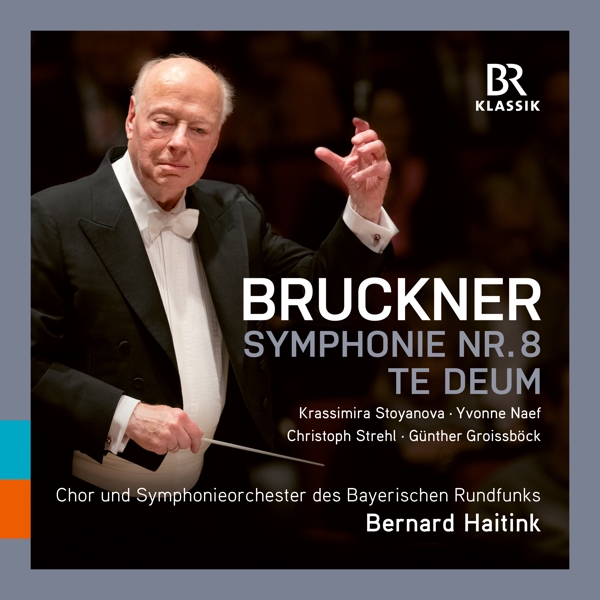
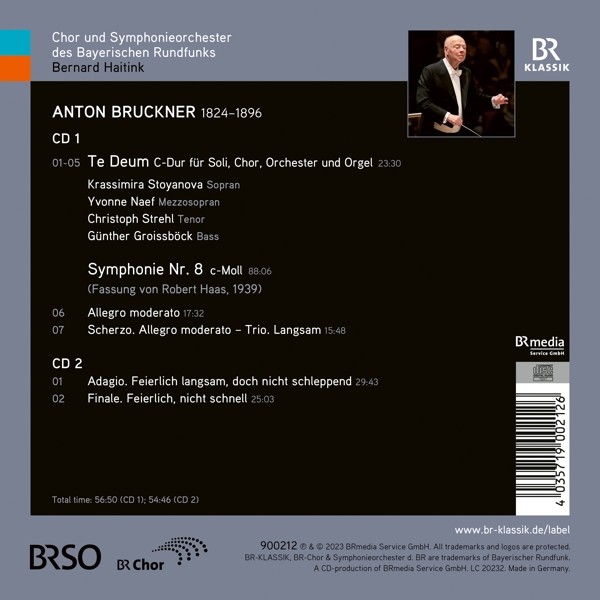
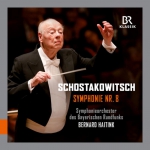















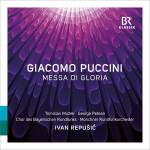

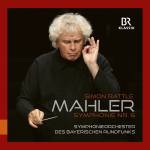


![Mariss Jansons / Chor & BRSO - Mariss Jansons-The Edition [DE-Version, Regio 2/B]](https://img.grooves.land/images/cover/200/900/c7hau962.j11)

